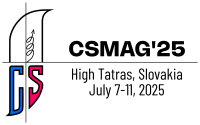Speaker
Description
Most biological processes take place at the nanoscale, allowing us to understand these processes and create new materials due to technical progress. Magnetic nanomaterials have considerable potential for use in medicine, e.g. in the distribution of the drug to the affected areas, in imaging, and therapy.
In this work, magnetite (Fe$_3$O$_4$) nanoparticles were prepared and functionalized with bovine serum albumin (BSA) to enhance their stability and biocompatibility. Reaction conditions (especially pH) significantly affected the binding of BSA and the stability of the complex. The surface modification of the nanoparticles was designed to support the efficient attachment of betulinic acid - a natural triterpenoid with potential anticancer effects.
The characterization of the prepared nanoparticles was carried out using various methods. Hydrodynamic size was measured by dynamic light scattering (DLS), surface charge of the nanoparticles and their stability was studied by electrophoretic mobilities measurements. The iron content and the amount of BSA adsorbed on the nanoparticles surface was evaluated by UV-VIS spectroscopy. The FTIR spectroscopy was applied to identify the functional groups involved in the BSA binding. The size and shape of the magnetic nanoparticle cores was obtained by transmission electron microscopy (TEM), and the magnetic properties of nanoparticles were studied by the vibrating-sample magnetometry (VSM).
The average size of bare nanoparticles obtained using TEM was $8$ nm. The results suggest that the optimized conditions enable efficient functionalization of magnetic nanoparticles, with potential applications in magnetic resonance imaging (MRI) diagnostics and disease treatment.
Acknowledgements
This work was supported by the Slovak Research and Development Agency under the contract no. APVV-DS-FR-22-0037 and Slovak Grant Agency VEGA 02/0049/23.

